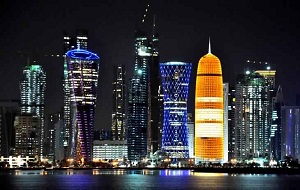
Qatar has welcomed more than 2.8 million visitors from around the world in 2014, representing an 8.2 percent growth over 2013, according to data revealed in Qatar Tourism Authority’s (QTA) annual report for the tourism industry.
The report, which was issued on Monday, showed a continued strong performance in 2014 with all key indicators of the tourism sector demonstrating improvement and growth compared to 2013. Although in its early stages of development, the tourism sector directly contributed QR 13.6 billion (approximately $3.7 billion) to GDP in 2013, representing 4 percent of Qatar’s non-extraction economy.
The total economic impact of tourism, including indirect contributions, tallied QR 28 billion (approximately $7.6 billion), comprising 8.3 percent of Qatar’s non-extraction GDP. Tourism also contributes substantially to the Qatari job market. In 2013, there were 61,000 jobs that directly supported the industry, according to QTA’s report.
Since 2009, international visits to Qatar have increased by 91 percent with an average annual growth rate of 13.8 percent. Qatar managed to attract visitors from several key markets, including GCC countries, which contributed 40 percent of the tourists visiting Qatar in 2014. Another 28 percent of the visitors originated from various parts of Asia and Oceania, while 15 percent of tourists came from European countries.
According to the report, visits from all regions of the world have grown substantially over the past five years, with Asian/Oceania and GCC visitor markets expanding by 107 percent and 102 percent respectively since 2009. Visits from Europe have also surged by 82 percent over the past five years.
Commenting on the report, QTA Chairman Issa bin Mohammed Al Mohannadi said such “impressive” results would not have been possible without the “hard work of QTA, and its public and private sector partners,” which was based on the National Tourism Sector Strategy 2030. “I am confident that the tourism sector’s achievements will continue to reach greater heights in 2015 through newly launched initiatives and products to enrich the tourism sector and diversify tourism offerings.
The result will be more visits from tourists from all over the world, thus achieving the strategy’s goal of establishing Qatar as a preferred international tourism destination with deep cultural roots.” Hotels experienced strong performance in 2014, according to QTA’s annual report. Occupancy rates increased across all classes of hotels, with the average hotel occupancy rate reaching 73 percent in 2014 compared to 65 percent in 2013.
The largest gains were experienced by the five-star hotels segment, which realized a surge of 71 percent compared to 61 percent in 2013. The strong increase in demand translated into revenue increases across the entire industry. RevPAR (revenue per available room) increased by 8.3 percent in 2014 with particularly strong performance in the five- and three-star segments, which witnessed gains of 9.5 percent and 15.5 percent, respectively.
The last year witnessed the launch of the Qatar National Tourism Sector Strategy 2030, a turning point for the tourism industry in Qatar.
The strategy is designed to serve as a road map for developing the tourism industry over the next decades and to guide QTA in its efforts to turn Qatar into “an international tourism destination with deep cultural roots.” QTA plays a key role in coordinating a sustainable tourism sector and increasing the contribution of this sector to a diversified national economy.
Working with colleagues at the Ministry of Development Planning and Statistics, the Ministry of Economy and Commerce, the Ministry of Interior, and the Ministry of Finance, QTA facilitated the development of Qatar’ first Tourism Satellite Account (TSA), an international measurement system to quantify the economic contribution of travel and tourism to a country’s GDP. The data and estimates derived from this work will inform QTA’s strategic progress.
As for cooperation with international tourism organizations, QTA launched a second cooperative agreement with the United Nations World Tourism Organization (UNWTO), which aims to assess current statistical systems, build capacities on both local and regional levels.
A new batch of trainees was selected to join the Tour Guide License Program, a tour guide training course sponsored by QTA. In cooperation with UNWTO, QTA completed the first phase of a regional capacity-building program.
QTA opened more representation offices in key international travel markets following initial openings in London and Paris. In May, QTA opened a new representative office in Germany to promote Qatar as a destination in the German-speaking countries of Europe. In November 2014, QTA opened a representative office in Saudi Arabia, with branches in Jeddah and Riyadh, to attract tourists from other GCC states, particularly Bahrain, Kuwait, Oman, the United Arab Emirates, and Saudi Arabia. In December, QTA opened a representative office in the fast-growing South East Asian market, with special focus on Singapore, Malaysia, and Hong Kong.
Source : Qatar News Agency












